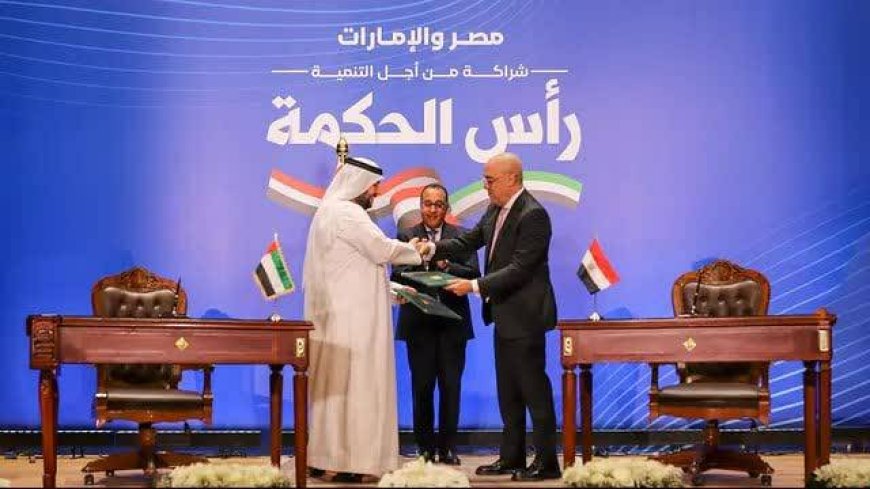The UAE's $35 Billion Investment in Egypt: Implications and Concerns
In a long-anticipated move, Egyptian Prime Minister Mostafa Madbouly officially announced on Friday, February 23, the signing of a groundbreaking agreement with the United Arab Emirates (UAE) that is set to mark the largest investment in Egypt's history, amounting to a staggering $35 billion. However, as the report reverberates across political and economic landscapes, a critical examination of the terms and ramifications of this monumental deal becomes imperative.

According to official statements from both Egyptian and Emirati authorities, Abu Dhabi Development Holding (ADQ) of the UAE is slated to spearhead the development of a cutting-edge city in the Ras Al-Hikmah district on Egypt's northwest coast. This futuristic urban enclave is envisioned to encompass a wide array of residential areas, hotels, resorts, schools, recreational facilities, and a technology-driven free zone catering to industries spanning logistics, finance, and commerce. Notably, plans also include the construction of an international pier for yachts and cruise ships, along with a state-of-the-art international airport within the city’s confines.
The ambitious project is slated to commence construction on a 170-square-kilometer expanse, envisioned as a "next-generation city" that, when completed, will rival one-fifth the size of Abu Dhabi City itself. While a timeline points to a commencement date in early 2025, the financial benefits are poised to cascade into Egypt much sooner. Prime Minister Madbouly has divulged that within a week of the agreement, Egypt is set to receive $15 billion, with an additional $20 billion to follow within two months. Of these funds, $24 billion will be imported directly from the UAE in foreign currency, while another $11 billion will be sourced from the conversion of UAE deposits in the Central Bank of Egypt into Egyptian pounds.
The historical ties between Egypt and the UAE run deep, with the UAE holding the mantle as the largest Arab investor in Egypt and the third-largest globally. Over the period spanning 2003 to 2019, the UAE has injected more than $28 billion into Egypt's economy, fostering a robust presence of 1,300 Emirati companies across diverse sectors including retail, transportation, finance, real estate, and agriculture. Forecasts indicate a projected $30 billion investment from the UAE in Egypt by the close of 2021, with prospects for further escalation on the horizon through sustained bilateral collaboration.
The rationale underpinning the monumental pact between Egypt and the UAE can be discerned against the backdrop of Egypt's profound economic tribulations. With a populace exceeding 109 million grappling with acute inflation, foreign currency shortages, and a burgeoning poverty epidemic, the imperative for external financial infusion looms large. Under the protracted presidency of Abdel Fattah El-Sisi, Egypt's foreign debt has soared to a staggering $164 billion, eclipsing investment as the primary source for sustaining governmental expenditures.
The urgency of Egypt's economic predicament is underscored by projections from the Central Bank of Egypt, which forecasts a daunting obligation of $34.8 billion in foreign debt repayments for 2024 alone, against the backdrop of dwindling foreign currency reserves amounting to a mere $35 billion. In light of these pressing exigencies, Egyptian authorities have been compelled to explore diverse avenues to navigate the nation's fiscal quagmire, with the UAE's investment overtures assuming a pivotal role in this unfolding narrative.
However, as Egypt embarks on this transformative economic trajectory, concerns linger regarding the potential ramifications of such hefty investments. Critics argue that the UAE's strategic interests in leveraging Egypt's economic vulnerabilities for its own gain underscore a broader narrative of power consolidation and influence peddling on Egyptian soil. The specter of economic sovereignty being compromised in the pursuit of short-term financial respite raises pertinent questions regarding the long-term implications of such agreements on Egypt's political and social fabric.
In tandem with the UAE's landmark investment, reports have surfaced indicating Saudi Arabia's impending $15 billion pact with the Egyptian government, mirroring the contours of the Egypt-UAE deal aimed at the development of Ras Al-Ghimila, a key tourism hub on the Red Sea coast. As discussions around the proposed agreement gain momentum, the specter of strategic assets, including land and resources, being tendered for financial solace in the face of Egypt's economic turmoil underscores the delicate tightrope that Cairo must traverse in safeguarding its national interests amidst external overtures.
In conclusion, while the UAE's monumental investment in Egypt signals a watershed moment in the economic landscape of both nations, the broader implications and underlying power dynamics merit vigilant scrutiny. As Egypt navigates the treacherous waters of economic uncertainty, the imperative for judicious governance, transparent negotiations, and a steadfast commitment to safeguarding national sovereignty amidst the allure of foreign investments looms large. The future trajectory of Egypt's economic resurgence hinges on a delicate balance between leveraging external partnerships for growth and preserving the nation's intrinsic autonomy and strategic interests in the face of mounting economic exigencies.













































